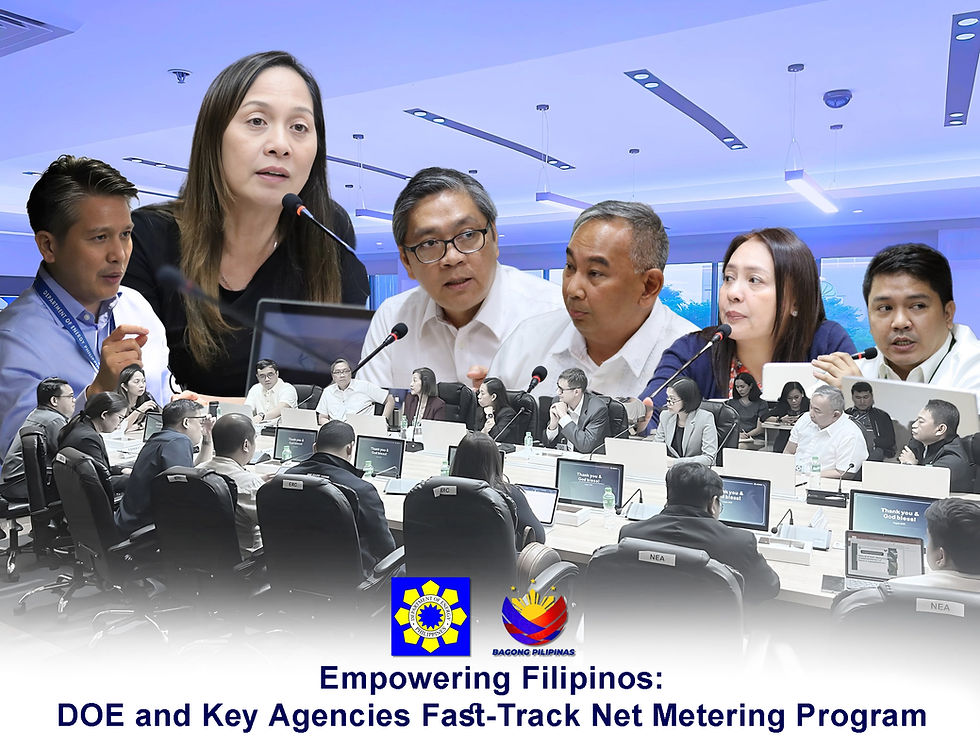Empowering Filipinos: DOE and Key Agencies Fast-Track Net Metering Program
- markallenperez
- Aug 26, 2025
- 2 min read

Responding to President Ferdinand R. Marcos Jr.’s call in his State of the Nation Address to cut red tape and deliver immediate relief to electricity consumers, the Department of Energy (DOE) spearheaded an inter-agency meeting on August 14, 2025, to tackle long-standing bottlenecks in the Net Metering Program.
The initiative brought together key players—the Energy Regulatory Commission (ERC), Department of the Interior and Local Government (DILG), National Electrification Administration (NEA), and Meralco—united in their goal to simplify procedures and set a clear, predictable process for applicants. By removing bureaucratic hurdles and harmonizing requirements, the program aims to transform ordinary Filipinos from passive electricity users into empowered “prosumers”—households that can both consume and generate clean energy.
“Every day we delay is another day Filipino consumers lose the opportunity to cut their electricity bills and benefit from their own renewable energy production,” stressed Energy Secretary Sharon S. Garin. “The President’s directive is clear: the Net Metering Program must work for the people. We are tearing down the walls of red tape, setting uniform rules, and fast-tracking approvals so households can start producing and selling clean energy without drowning in paperwork.”
Breaking Down Barriers
During the discussions, the agencies pledged to re-enforce existing policies, establish strict timelines at every stage of application, and roll out simplified, standardized forms. These measures are expected to make the process more accessible, particularly for consumers served by electric cooperatives, where cumbersome requirements have discouraged many from joining the program.
A major source of delays has been the issuance of Certificates of Final Electrical Inspection (CFEI) and Electrical Permits from local government units. While these permits are intended to ensure safety, applicants often face additional requirements unrelated to electrical compliance—further prolonging the approval process.
Meralco’s Commitment to Reform
Supporting the government’s push, Meralco committed to digitizing and modernizing its net metering system. This includes accreditation of solar PV installers, standardization of solar equipment, and adoption of digital platforms to reduce paperwork and processing time. These reforms are seen as vital steps in making renewable energy more accessible and practical for everyday households.
Power in the Hands of the People
Under the Net Metering Program, consumers with renewable energy facilities of up to 100 kilowatts (kW) can export excess electricity to the grid in exchange for peso credits equivalent to the blended generation cost. These credits are then deducted from their monthly bills, providing both financial relief and an incentive to invest in solar energy.
As of May 2025, there are already 17,175 registered participants nationwide with a combined capacity of 157 MWp. Yet, the program’s potential remains underutilized due to the excessive requirements—some areas demanding as many as 15 different documents—and lengthy waiting times before energization.
A People-Centered Energy Transition
The inter-agency collaboration marks a pivotal step toward dismantling barriers that have slowed the growth of clean energy adoption in the Philippines. More than lowering household expenses, the initiative embodies the government’s broader vision of a people-driven energy transition—one where Filipinos are not just consumers but active partners in building a cleaner, more sustainable future.





Comments